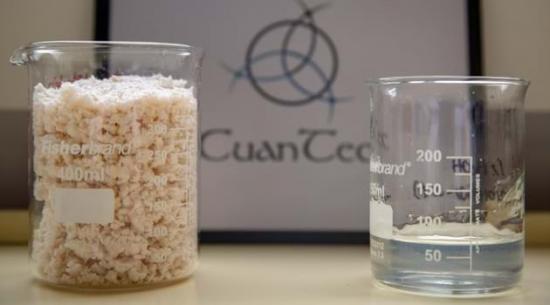Project To Use Food Waste To Tackle Plastic Pollution
21st December 2019

An international collaboration project to develop plastic-free food packaging material from food waste, initially langoustine shells, has been awarded £268,284.
The research and development project called the Celtic Crustacean Collaboration is being led by Argyll based firm, CuanTec Limited, working with the Scottish Association of Marine Science (SAMS).
Both are based at the European Marine Science Park (EMSP) near Oban.
They are working with Versatile Packaging in the Republic of Ireland and with Northern Ireland firm, Kilkeel Seafoods.
Over the next three years the project is expected to lead to the creation of up to 13 new jobs in Argyll.
CuanTec has developed a world-first method for biologically extracting a naturally occurring polymer, chitin, from waste langoustine shells and converting this to the base material for plastic-free food packaging.
The company's process is environmentally sensitive, cost-efficient, requires less energy, and uses 95% fewer chemicals than conventional processes.
The resulting packaging material has natural food preserving properties and will be home compostable. It also has the ability to keep food fresh and potentially extend shelf life.
This new project will focus on the commercial viability of the product through developing industrial scale methods of extracting and converting the polymer from the shells and other food waste sources of chitin.
It will further test the product against industry regulatory standards and end-user requirements and investigate other potential sources of the polymer.
Funding has been made possible through HIE’s role as a delivery partner in the EU INTERREG VA funded Co-Innovate programme. This €14.7 m programme - including €2.2m from HIE - supports innovation and cross-border R&D projects in parts of Scotland, Northern Ireland and the Republic of Ireland.
Confirming the HIE funding, Gillian Galloway head of innovation, said:"Plastic packaging is recognised as being at the root of a major waste pollution problem, particularly in the sea and around the coast. This highly innovative project has the potential to help address this issue through reducing the use of plastic. It will also help cut carbon emissions from the burning of unrecycled plastic waste. It is exciting to see this level of innovation being developed in Argyll and in such a collaborative fashion.
“We are very pleased to be able to support this initiative as part of the international Co-Innovate programme, and very much look forward to seeing the product move towards commercialisation."
Dr Tracy White, head of science at CuanTec, said:“We’re dedicated to developing solutions to the issue that single-use plastic is creating. I graduated from SAMS and I know, first-hand, the calibre of facilities and resources it offers to bio-tech businesses like ours. We’re confident we’re in the right place to make a significant contribution to this global challenge.”
The Co-Innovate programme encourages cross-border research and innovation among small to medium enterprises (SMEs) in fragile areas.
In Scotland it supports innovation in SMEs in Argyll and Bute, Lochaber, Skye and Lochalsh, the Outer Hebrides, Ayrshire and Arran, and Dumfries and Galloway. It also covers Northern Ireland and the border counties of Ireland.
The Co-Innovate programme is supported by the European Union's INTERREG VA Programme, managed by the Special EU Programmes Body (SEUPB). It aims to increase the number of businesses participating in cross-border, transnational or interregional research projects.
The Co-Innovate partnership is led by InterTradeIreland and includes HIE, Scottish Enterprise, Enterprise Northern Ireland, the Local Enterprise Offices in the border counties of Ireland, and East Border Region Ltd.
Match-funding for the Co-Innovate programme has been provided by HIE and Scottish Enterprise in Scotland, the Department for the Economy in Northern Ireland and the Department of Business, Enterprise and Innovation in Ireland.
